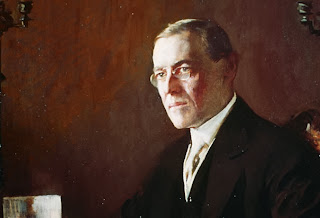After being elected Democratic governor of New Jersey in 1911 , Wilson became a national figure because of his views on progressive reform . The following year he was elected as the twenty- eighth President of the United States. In the coming years concentrated on measures of competition and the reorganization of the federal banking system .
Woodrow Wilson Biography
At the outbreak of World War I , President Woodrow Wilson declared a policy of strict neutrality . Although the U.S. had strong ties with Britain , Wilson was concerned about the large number of people in the country who was born in Germany and Austria. Other influential political leaders argued strongly in favor of the U.S. maintains its isolationist policy . This included the pacifist lobby group , the American Union Against Militarism .Some people argued that the U.S. should expand the size of its armed forces in case of war . General Leonard Wood , former Chief of Staff of the U.S. Army Formed the National Security League in December 1914 . Wood and his organization called for universal military training and the introduction of compulsory military service as a means of increasing the size of the U.S. Army .
Opinion against Germany intensified after the sinking of the Lusitania . William J. Bryan , Secretary of State pacifist , Wilson resigned and replaced by the pro-Allied Robert Lansing . Wilson also announced an increase in the size of the U.S. armed forces . However, in the 1916 presidential campaign , Woodrow Wilson emphasized its policy of neutrality and his team used the slogan : " He kept out of the war " .
The January 31, 1917 , Germany announced a new submarine offensive . Wilson responded by breaking diplomatic relations with Germany. The publication of the Zimmerman telegram , which suggested that Germany was prepared to help Mexico regain territory of Texas and Arizona, intensified popular opinion against the Central Powers.
On April 2 , Wilson asked permission to go to war. This was approved in the Senate on April 4 by 82 votes to 6 , and two days later , in the House of Representatives by 373-50 . Still avoid alliances , war was declared against the German government (instead of his subjects ) . Wilson also insisted that the U.S. was an associated power rather than a member of the Allies.
On January 8, 1918 , President Woodrow Wilson presented his Agenda for Peace of Congress. Prepared by a group of experts on U.S. foreign policy , the program included fourteen different points. The first five points discussed general principles : Point 1 renounced secret treaties and point 2 treated with the freedom of the seas , 3 called for the elimination of trade barriers around the world and defended point 4 arms reduction and Item 5 suggested that international arbitration of all colonial disputes.
Points 6 to 13 were concerned about specific territorial issues , including claims made by Russia, France and Italy. This part of the program of Wilson also raised issues such as control of the Dardanelles and demands for independence by the people living in the areas controlled by the Central Powers.
All major countries involved in World War I objected to certain points in the Wilson Peace Program . However, when peace negotiations began in October 1918 , Wilson insisted that his Fourteen Points should form the basis for the signing of the Armistice .
Wilson attended the Paris Peace Conference and supported the Treaty of Versailles. However, the Republicans now control the Senate , and he did not like the proposal of the League of Nations.
When the Senate refused to ratify the Treaty of Versailles , Wilson began a national campaign to win support for the Paris Peace Agreement . While on this tour , he collapsed ( September 26, 1919 ) and was an invalid for the past three and half years of his life.
Thomas Woodrow Wilson died in 1924 - Woodrow Wilson Biography
 By
Published: 2013-11-11T23:44:00-08:00
Woodrow Wilson Biography
Publish Woodrow Wilson Biography di Bio Street, updated at: 11:44 PM. URL http://abalabalnyoba.blogspot.com/2013/11/woodrow-wilson-biography.html.
By
Published: 2013-11-11T23:44:00-08:00
Woodrow Wilson Biography
Publish Woodrow Wilson Biography di Bio Street, updated at: 11:44 PM. URL http://abalabalnyoba.blogspot.com/2013/11/woodrow-wilson-biography.html. Redaction Michele Brown



